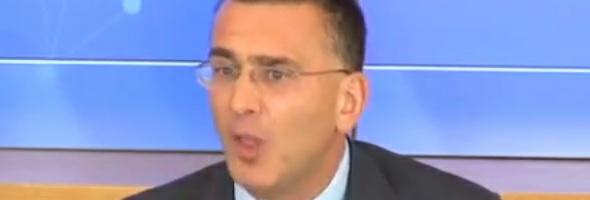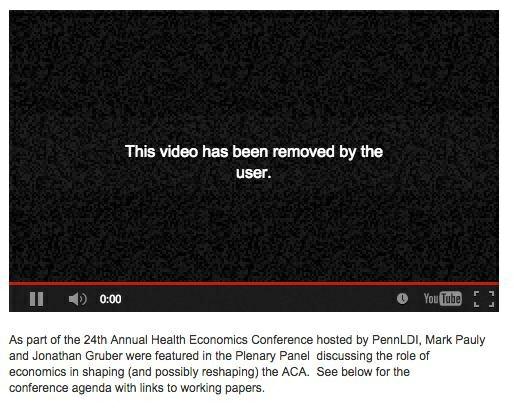
Claim: Obamacare architect Jonathan Gruber said Obamacare only passed due to the "stupidity" of the American voter and a lack of "transparency," and video footage of his remarks was deleted from the Internet in an attempt to hide it.
 | TRUE: Jonathan Gruber said Obamacare only passed due to the "stupidity" of the American voter and a lack of "transparency. |
 | UNDETERMINED: Video footage of his remarks was deleted from the Internet in an attempt to hide it. |
Example: [Collected via Twitter, November 2014]
Hey Media, is UPenn pulling the Gruber video where he says ObamaCare passed by Democrats lying to the public a newsworthy event? Just askin'
Jonathan Gruber, an Obamacare's architect admitted that lack of transparency/stupidity of electorate helped pass the bill
Origins: In November 2014, a
involving Jonathan Gruber, a consultant who served as a technical consultant to the Obama administration and Congress during the creation of the Patient Protection and Affordable Care Act (also known as the ACA or "Obamacare"), began to circulate on the internet. Gruber made the remarks captured in that excerpt during the
Gruber, a Massachusetts Institute of Technology professor of economics, was speaking at a panel titled "The Role of Economics in Shaping the ACA and How Economics Can Inform Inevitable Mid-Course Corrections." The footage from which the comments originated ran for nearly an hour and covered issues tangential to Obamacare, such as its classification as a tax, subsidies, and how the bill came into law. Gruber's controversial remarks come at around the
During the portion of the video in question, Gruber said:
This bill was written in a tortured way to make sure [the Congressional Budget Office] did not score the mandate as taxes. If CBO scored the mandate as taxes, the bill dies. OK? So it's written to do that. In terms of
After video of the conference was put online, Gruber elaborated on what he meant by his attention-garnering remarks and apologized for them, saying that he "spoke inappropriately":
"In terms of risk-rated subsidies, if you had a law which explicitly said that healthy people pay in and sick people get money, it would not have passed," he said. "You can't do it politically, you just literally cannot do it. It's not only transparent financing but also transparent spending." In the video, Gruber appeared to be speaking specifically about the political environment in 2010 and its impact on the law's funding mechanisms. Gruber takes a critical stance on some of those outcomes, calling them "irrational." "I wish Mark was right and we could make it all transparent but I'd rather have this law than not," Gruber said. "That involves tradeoffs that we don't prefer as economists but are realistic." Gruber apologized for his comments during an on-air interview with MSNBC's Ronan Farrow. "The comments in the video were made at an academic conference," Gruber said. "I was speaking off the cuff and I basically spoke inappropriately and I regret having made those comments." Although Gruber apologized for the language he used, Gruber said that the larger point he was trying to make centered on the political pressures that shaped the law. He added that those pressures "led to an incomplete law with some typos." "It would have made more sense to do Obamacare the way we did in Massachusetts, which would be to just give people money to offset the cost of their health insurance," Gruber said. "That was politically infeasible and so instead it was done through the tax code."
Gruber's comments were part of a broader public conversation between him and economist Mark Pauly on the economics of health care reform. Gruber was responding to a remark by Pauly about financing transparency in the law and the politics surrounding the ACA's individual mandate. The political process, he said, striking a critical tone, resulted in inefficiencies in the law which should be corrected.
The full video of the 2013 Health Economics Conference was published by PennLDI on YouTube, and when the excerpt video of Gruber's remarks began to circulate online, many viewers assumed the comments to be recent (they were not), and others maintained PennLDI then removed the clip from the Internet due to the political controversy. On the latter point, several Twitter users posted screenshots of a YouTube error page that indicated the source video had been (at least briefly) removed by the University after Gruber's remarks became a focus of attention:

However, it isn't yet clear whether the PennLDI video was deliberately pulled from the Internet due to the political controversy it created, or whether it was made unavailable at some point after it was initially posted for unrelated reasons (e.g., error, copyright issues, technical problems).
It appears the comments made by Gruber entered the stream of social media hot topics when they were spotted and excerpted from the longer PennLDI video by Philadelphia investment adviser
My wife texts to say the latest Gruber video we posted is lighting up her Facebook feed... excellent...
— Phil Kerpen (@kerpen) November 10, 2014
The claim that the University of Pennsylvania deliberately tried to scrub the clip from the Internet may also have stemmed from Kerpen or the PAC:
Um, hey, University of Pennsylvania: Pulling the Gruber video now really doesn't help your cause. https://t.co/KoW7Kx2WLb
— Phil Kerpen (@kerpen) November 10, 2014
Last updated: 12 November 2014
